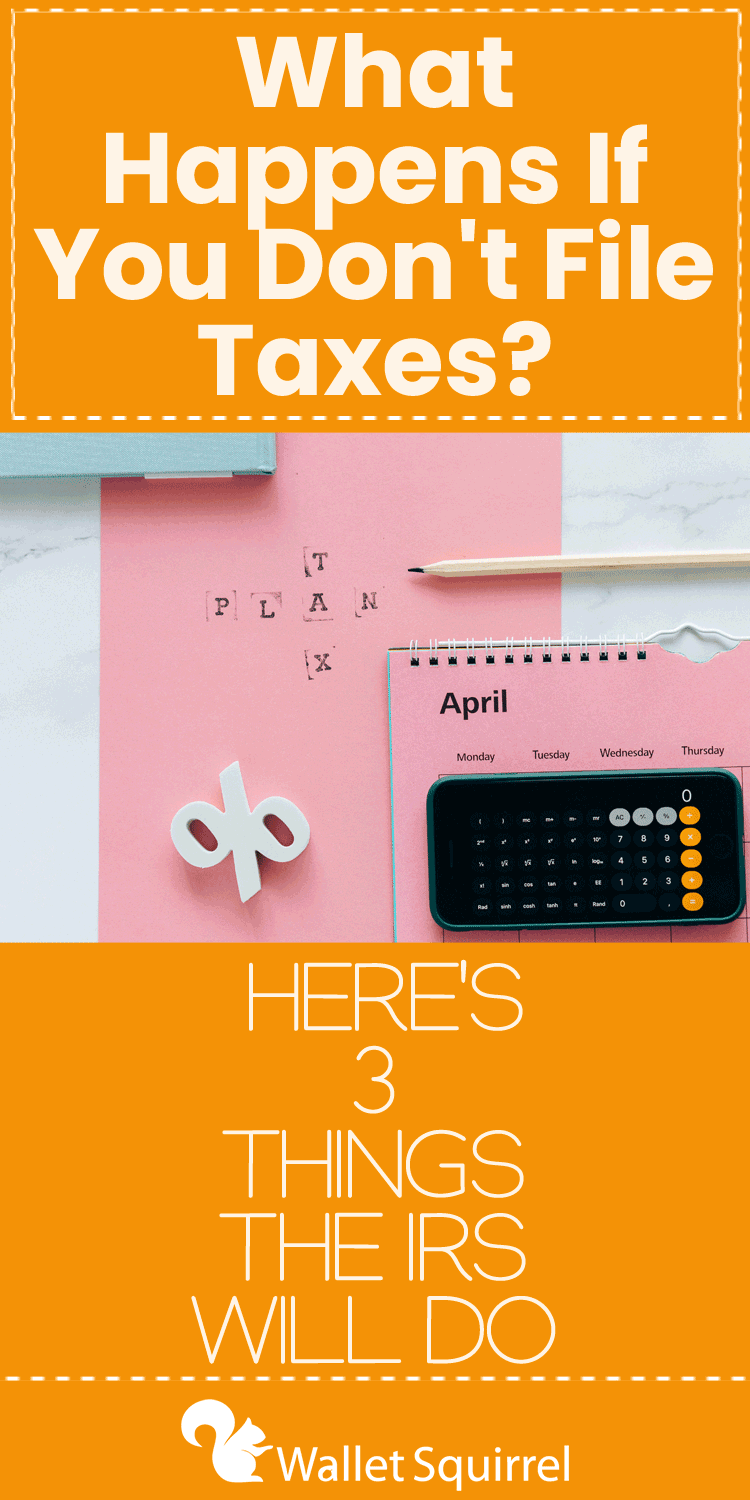What Happens If You Don’t File Taxes? Here’s 3 Things The IRS Will Do

What Is A Tax Return, and When Do I Need To File One?
All this talk about filing and not filing might cause you to overlook what a tax return is in the first place. Formally, the IRS refers to an individual’s tax return as Form 1040, and you must file it each year by the federal tax filing deadline if you meet specific criteria.
Specifically, it will depend on three things (usually):
- Your age
- Filing Status
- Gross Income
Starting with age, you’ll need to file if you’re 18 and not claimed as a dependent by your parents or guardians. Assuming you make a certain minimum income level depending on your filing status.
For those, you’ll need to exceed the standard deduction for each relevant filing status:
- Single / Married, Filing Separately: $12,400 (unless you’re 65+, then it’s $14,050)
- Married, Filing Jointly: $24,800 (you and your spouse are 65+, then it’s $27,400)
- Head of household: $18,650 (65+ is $20,300)
If you make above these minimum thresholds, you will need to file a federal income tax return at a minimum. However, this does not mean you shouldn’t file one if you earn less.
The IRS issued two Economic Impact Payments (better known as stimulus checks) in 2020, with another one in 2021. The IRS needs to see proof of your income, and that means sending them a completed Form 1040 (or using their other reporting tools designed explicitly for non-filers).
The simplest way to claim your stimulus check and any future checks is through filing a basic Form 1040.
What Happens If You Don’t File Taxes?
Now that we’ve established the ground rules for when you need to file a tax return let’s talk about the consequences of what happens if you don’t file taxes.
1. Penalties and Interest
First and foremost, you’ll get hit with the IRS’s most used weapons: penalties and interest. When you miss a payment on taxes you owe, the IRS has a vested interest in ensuring they collect. To guide you toward making this decision yourself, they put penalties and interest charges on the taxes you owe if not submitted with your return.
That means if you made a bunch of money trading stocks on Robinhood or alternative ways to make money, you’d need to loop in Uncle Sam and send him some money. Otherwise, he intends to come after you with some added penalties and interest.
Specifically, you’ll need to pay the IRS interest worth 0.5% of the tax owed for each month that you’re late from the original due date. For example, if you owe $10,000 and taxes are due on April 15, but you don’t file your return until May 15, that’ll be $50 coming out of your pocket in interest.
This will continue to grow until you pay the tax owed or hit the total 25% maximum penalty. If you continue not paying your tax, the interest rate increases from 0.5% to 1% if you don’t pay the tax balance after ten days following the IRS issuing you a notice of intent to levy.
As for the penalty you face for not filing your return, you also get hit with a late-filing penalty worth 5% of the tax owed per month in most circumstances. This maxes out at five months. When you file your return over 60 days after it originally was due to be filed, the minimum penalty you’ll face for late idling is the smaller of $135 or 100% of the tax owed.
2. The IRS Files a Substitute Return for You
Strongly advise avoiding this outcome. If you think you know your tax situation better than the IRS, you will likely claim the correct tax deductions and credits on your form. If left in the hands of the IRS, they will only fill out your Form 1040 based on the information the IRS can pull from you and other sources.
In most cases, this likely draws up an incomplete picture of your tax situation. Often, this leaves more money in Uncle Sam’s hands because they might only see the income-generated assets you hold or other items that trigger tax liability. They might not see the deductions you rightfully could claim or the tax credits which might lower your taxes owed.
This happens because a substitute return doesn’t account for additional deductions, credits, and exemptions you may usually claim if you prepare your return.
3. The IRS Will Begin the Collections Process
No way is this a fun process. This allows the IRS to come after your income through garnished wages, levy money directly from your bank accounts, or even placing a federal tax lien against your property.
None of this sounds like anything worth pursuing and rarely results in an ideal outcome for you. Simply if you’re asking “What happens if you don’t file taxes”. You’ll be met with a myriad of unintended consequences that can impact your financial (and mental) health long-term.
In fact, if you fail to pay your tax balance owed promptly (i.e., by tax day), this decision can hurt your credit score. This happens because the IRS reports the Notice of Federal Tax Lien in court, which credit rating agencies will notice.
What Happens If I Can’t Pay My Taxes Owed?
If you’ve failed to file your tax return because you don’t believe you can afford to pay the taxes you owe. Know you’ve got options.
The IRS offers you to file a payment plan which can result in you making installment payments over a more extended period. If you don’t know your full tax liability by the time the federal filing deadline comes around, you can also file a Form 4868, Application for Automatic Extension of Time to File U.S Individual Income Tax Return.
This allows you to file by October 15 of the year when your return usually is due, and the IRS automatically grants you this extension. Despite this automatic action, you will still need to pay the amount of money you believe you owe.
That means paying money upfront you might end up getting back after you file your Form 1040 by the new deadline. Not paying by April 15 means you’ll get hit with the undesirable actions above.
You can request an automatic extension to file your individual income tax return in three ways:
- Pay all or part of your estimated tax due and then indicate your estimated payments are for an extension using Direct Pay or using a credit card or debit card.
- You can file Form 4868 by accessing the IRS e-file using your tax software or through the use of a tax professional who uses e-file
- File a paper Form 4868 and enclose your payment to the IRS of the estimated tax you owe
Understandably in today’s fintech-enabled world, option 3 is the least favored by the IRS. They want everything digitally, if possible.
When Filing A Tax Return Makes Sense.
99% of the time, it always makes sense to file a tax return and by the deadline. Doing so might seem like a cumbersome task depending on your unique circumstances, but it also avoids running afoul of the IRS and their auditors.
The IRS has a statutory obligation to collect what you owe the federal government. Still, they also understand you might need some added time to calculate your entire tax liability.
They offer payment plans and tax extensions to assist with this burden. To avoid the unwanted penalties and interest that come what happens if you don’t file taxes, you’ll want to file on time each year.
If you can’t get the money together to send to the IRS by tax day, requesting a payment plan avoids several negative consequences like an impact on your credit score, garnished wages or assets, or even a federal lien placed against your property.
If it comes down to it, the IRS can also jail you for outright refusal to pay what you owe. That’s not an outcome anyone ever wishes to face. Therefore, consider looking into some easy-to-use tax software like Turbotax or consulting with a tax professional before choosing to ignore the IRS.

Riley Adams is a licensed CPA who works at Google as a senior financial analyst. He also runs Young and the Invested, a site geared toward helping younger generations invest, manage and plan their money with confidence.



